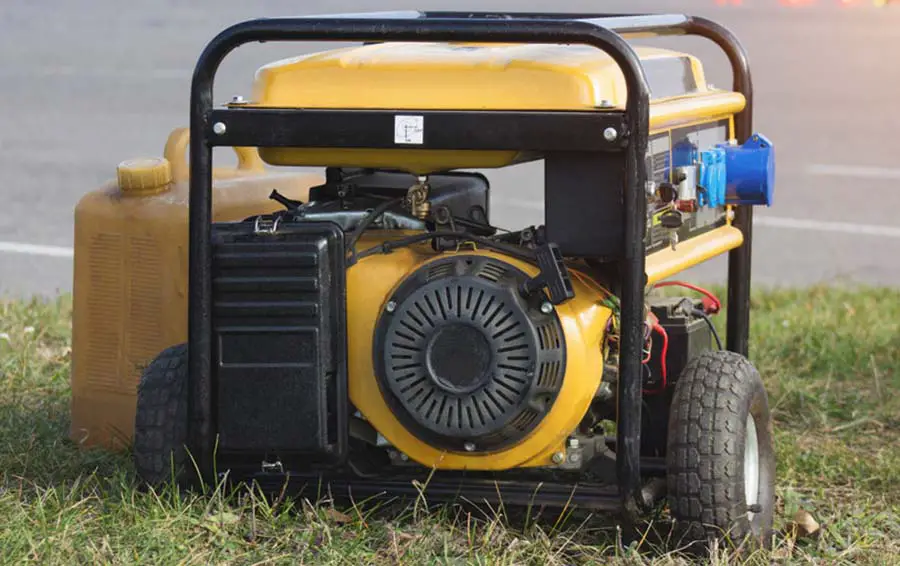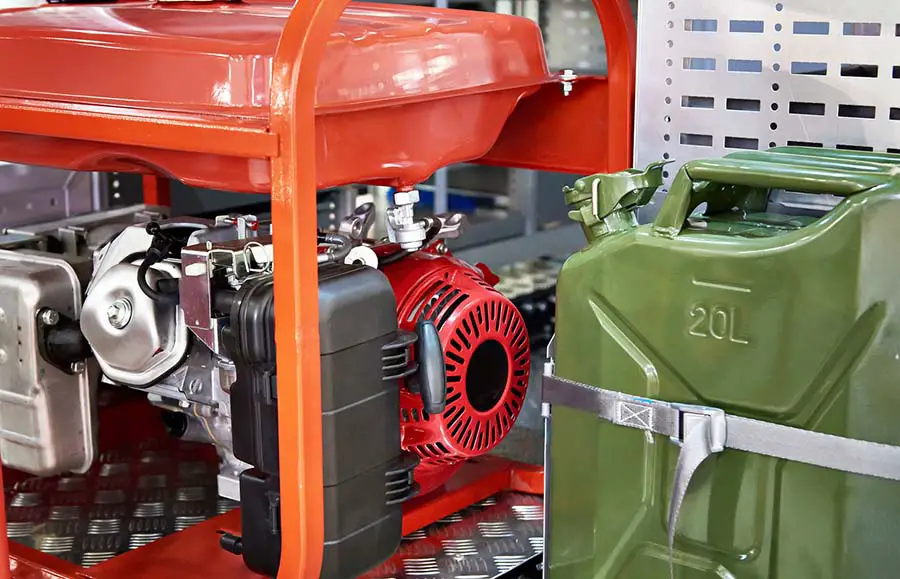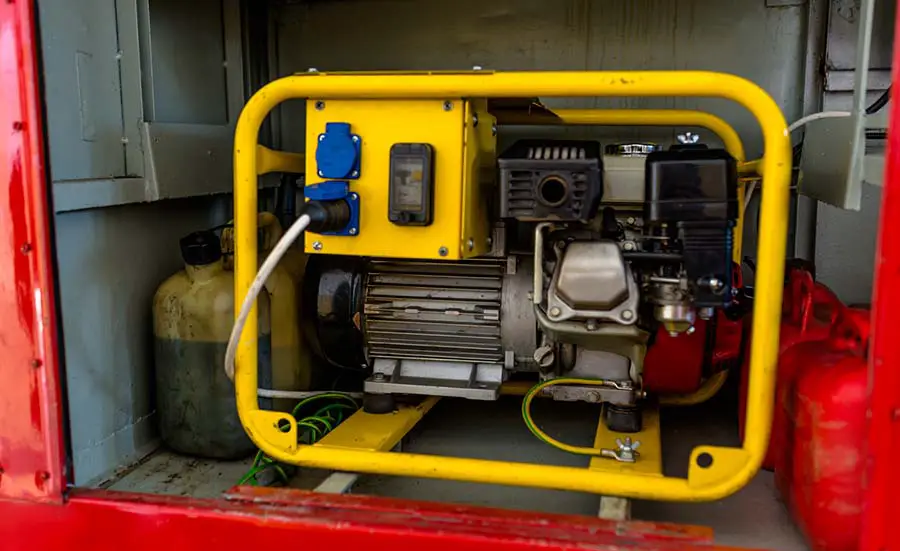
When you have your generator running for hours each day, quite a few things will become apparent. One is that you cannot keep it fully fueled and ready to go as you will become distracted while doing other things, leading to many headaches.
It is bad to run a generator that has run out of gas, especially if it is a generator that is currently under load. The generator will lose its magnetism if it is currently powering something and can be damaged, requiring that you have the coils magnetized at specialized stores.
The complexities of a generator need to be understood before you can safely have it run constantly. Many people have made simple mistakes, causing their generators to quickly die as they can no longer properly run and generate power, usually because of simple mistakes.
What Happens When a Generator Runs Out of Gas?
Before we start focusing on why your generator may run out of gas while it is running, we will be looking at what happens when it does. Understanding the consequences of an empty fuel tank will usually help you remember to never run it dry without the intention of doing so.
There are reasons that you may want to run your generator dry or without fuel, but you will need to understand what happens during this process. Many people assume that the worst that can happen is their generator is more challenging to start the next time you need it.
Fuel System
When running the fuel system empty, it means that the generator has sucked up all the fuel that is inside it. This is what you want when storing the system for an extended period, and you are ready to have it completely reprimed and ready, which can take about an hour to do.
However, if it has run empty completely and you immediately pour more gas trying to get it to start up, you introduce air bubbles. These bubbles cause gas flow to be interrupted, causing misfires and a few other problems that damage your generator’s internal components.
Lubrication System
Many generators rely on fuel to help with the overall lubrication of the system, allowing the generator to run smoothly. You will need to check how your generator works specifically, but if the fuel runs out, it can damage the inside of your generator.
While this will not cause a problem immediately, it can cause a problem if the generator is constantly allowed to run out of fuel. Like all mechanical systems, the machine can handle being damaged once or twice throughout its life but will quickly break if constantly neglected.
Magnetism While Powering
If your generator is power your home or powering something else, when the gas does run out, it can cause a great deal of damage to the power generation parts of your generator. Every generator needs some magnetism to work correctly within the coils that generate the power.
As the generator spins, it turns a set of magnets inside a set of copper coils; as the magnets spin, they automatically create resistance against the copper and generate power. If your generator runs out of fuel when it is power your home, these magnets will lose their magnetism, losing the ability to produce power.
How Do Generators React To Not Having Fuel?
Now that we know what exactly happens when a generator runs out of fuel let’s look at the different types of generators and how each reacts to not having fuel. There are many kinds of generators, and each one will have different fuel systems.
We need to look at four types of generators as they are all massively different in size and will react in odd ways when left to run dry. Generators should not run without fuel, causing massive damage when they eventually run dry, and there is no one to stop them.
Portable Generators
The most common generator that you will find worldwide is a simple portable one that one person can carry around, sometimes two. These generators have wheels and use petrol as their fuel source with a tank above the generator for fuel.
Portable generators are the most likely to be damaged from having their tank run dry as they have no safety systems to switch them off automatically. Further, these generators will always keep running, even when there are only fumes left to power the engine, causing a lot of internal damage.
Standby Generators
We separate this from residential and industrial standby generators because you can use normal standby generators on anything, from farms to small businesses. However, they are not as small as residential, but not as large as industrial generators that are always ready to start.
These generators usually have large tanks for their needed gas and may even have safety systems to sense when they are not under load. Most of these generators will have smart switches that can turn off and warn when they sense that they are starting to run low on fuel.
Residential Standby Generators
In most countries, these generators are either portable generators or full-time systems with an external fuel source. In the US and Canada, these generators connect to gas pipelines that constantly provide fuel for the generator to run uninterrupted.
Because these systems do not expect gas to be a problem, they have several safety systems to disable when something goes wrong. Usually, they will have pressure sensors measuring the total pressure of the gas from the pipeline that shuts the generator off when there is no gas.
Industrial Standby Generators
Industrial standby generators are not systems that you will usually see as they are placed underneath giant buildings and are there to adhere to regulations. These systems run on Diesel fuel and have fuel tanks that are several hundred liters to ensure they can very rarely run empty.
Like other standby generators, they have automatic switches that turn the generator off when they sense that the fuel is low. Further, all diesel systems will work under high pressure, which means that the generator may refuse to start up if there is not enough fuel in the system.
How Long Will a Generator Run Before It Runs Out of Gas?

Each generator will run a different amount of time depending on how often you use it, how much fuel it has, how much power it is supplying, and how well it is maintained. Usually, a generator with a full gas tank can provide power for 8 to 12 hours straight without refueling.
However, if you are taxing the generator heavily, it will use a lot more fuel than it normally would, causing headaches as it nears empty faster than expected. Further, a poorly maintained generator will have to work harder to accomplish the same amount of work.
This is why any engine with dirty filters and not enough oil becomes so heavy on the gas as it struggles to breathe and move through its sludge. Having your generator maintained and serviced will always last the longest as it can work efficiently.
Why Would a Generator Run Out of Gas?
While in the best-case scenario, it should be obvious why your generator has run out of gas while it is running, there are instances where this does not happen. The generator will often run out of fuel because there are deeper issues with the total system instead of just using it all up.
Understanding the most likely to least likely reasons your generator will run out of gas without warning is essential. Several things can signify much worse problems within your generator that require the machine to be dismantled and fixed.
Not Refilled
The most likely and least problematic reason that your generator may be running out of gas while it is running is that someone forgot to check the fuel levels. Usually, this happens after restarting the machine while you constantly use it, with most people not used to constantly emptying it.
We always recommend that you check the gas level of your generator before you start it; this will tell you more or less how long it can run. Further, this prevents you from starting it when it is empty, which can cause a lot of frustration as it always sounds like it wants to start.
Clogged Fuel System
We have seen many people that assume your fuel tank will never get dirty while they leave the generator to stand in the rain constantly. However, because gas is one of the chemicals that can easily clean grease and dirt, it also absorbs any that contacts the clogging systems.
Your generator’s fuel system can become clogged with dirt and other particles if it is not maintained correctly, causing the fuel system to be dry. Fortunately, you can fix this by flushing the fuel system, replacing the fuel filters, and giving the generator new, clean gas.
Not the Right Fuel
It may sound odd, but the fuel you have added to your generator may be the entirely wrong kind. Many first-time generator owners are not always aware that the machines need specific gas to run correctly, or the balance will be slightly off.
The generator will not run dry when this happens, but it will stop having the internal combustion needed to produce power. When this happens, a long list of things will need to be fixed, replaced, and flushed before the generator can run again, as you need to remove all the old fuel.
Improper Storage
This is the only time you will want your generator to be run completely dry; when you store the system for a more extended period, you will need to remove the fuel. Most owners do this by removing the majority of the fuel, then running the generator to get rid of any remaining.
Doing this will easily and comfortably have the generator be empty, but you need to consider several things. Most importantly, your generator should not supply power to anything during this process to avoid demagnetizing.
Not Maintained
The simple and easy answer to why a generator will constantly run out of fuel and damage itself is when it is not well maintained. This usually means that the generator does not have the right filters, has older oil, or you might have refueled it incorrectly.
All of this together means that the generator uses significantly more fuel when running to compensate. It will eventually run dry long before you are ready to add more fuel, with many poorly maintained machines having other issues that make it worse.
Fuel Leak
Combined with poor maintenance or just bad luck, your generator can start to leak fuel, usually around a fitting or pipe that has aged. When this happens, you can usually smell the gas leaking out of the tank, but it can be hard to tell if you are busy refueling it.
Suppose you notice your generator has a pool of anything close to it or that the smell of gas is always around the generator you need to check for leaks. A leak can cause your generator to only run half as long as it really should, as half the gas or more leaks onto the ground.
Not Combusting
It may seem odd, but your generator can fail to combust properly, with one or more of the pistons not correctly doing their job. The reasons for this can be varied, with timing, fuel delivery, filters, and spark plugs all playing a part in why a piston may not be able to combust properly.
When this happens, it may look like there is some moisture coming out from the exhaust of the generator. However, with time it will cause the fuel to leak out of the dead piston, requiring the others to work harder and even causing the entire system to die, causing it to run dry while filled with gas.
How Do You Know If a Generator Has Run Without Gas?

Your generator will still start once refilled with gas; however, it may take a few tries to get the engine to start properly. However, the most significant sign is that it will not provide power even when the engine is fully operational as there is no magnetism.
The generator will always need a magnetic field to provide power to the house and anything else drawing power. When it has been run dry, this is the surest way that you will know that the machine has been damaged by being run dry, usually having the machine die while providing power.
We need to mention that if the generator is run until dry once or twice throughout its life, it will not fully lose the magnetism. The machine may handle it a few times, but it will start to lose a lot of performance as it is left to run dry without proper care given to the system.
Is It Okay To Leave a Generator Running All Night?
Yes, it is entirely okay to have your generator run straight through the night while you and your family may be asleep. You must ensure that it has enough fuel and is ready to go right before you go to bed to avoid it running out of gas in the middle of the night.
Many times, the real issue with running your generator through the night is that it can cause a massive buildup of CO2 gasses. You are causing danger to your family and the pets you may have sleeping outside of your house, as the gas is extremely poisonous to all animals.
We always recommend not having the generator running through the night unless it is vital for cooling or keeping livestock alive. Otherwise, it is a waste of gas and power to have the machine running right through the night and producing power when it is not required at all.
How Do You Remove Gas From a Generator?
You may be wondering how to remove the gas from your generator effectively if you need to transport it somewhere. Especially after you now understand all the dangers of running your generator without fuel for any amount of time.
There are several ways to clean out all the gas in your generator and have it properly working when you eventually remove it from storage. It is often part of regulations and laws that you need to empty your generator’s fuel before traveling.
Siphoning
The first part of taking out all of the fuel from your generator is to siphon everything out of the tank, as it will not be possible to tilt the generator. All you need to do is put a clean pipe in the tank and cause suction on it until the fuel starts coming out of the pipe.
Usually, if you push the pipe down to be lower than the tank, the entire process is a lot easier and faster as it will only require that the gas reach the pipe’s bend. You will often not need to be too heavy on the suction provided through the pipe as the fluid wants to move to the lowest point.
Closing the Choke
Once you have the tank as empty as possible, you need to empty the internal fuel system. This fuel system can often hold a few liters of fuel, with the pipes, the carburetor, and other parts all containing some fuel to keep the engine primed for when needed.
Starting the generator then closing the choke will have the machine use up all the trapped fuel in the system. Helping you empty it entirely and having your generator be travel-ready without having to dismantle anything or reject the generator.
Is It Okay To Run a Generator Without a Load?
It is generally not okay to run a generator for an extended period without a load on the system; even a low load can cause problems. We always recommend that people have a good load on the generator to ensure it works correctly and that the magnetism is not lost.
Unlike car engines, generators do not disengage when running; they provide power through their sockets even when you haven’t plugged anything into them. This means that the generator is turning, providing power, but that power has nowhere to go, causing the machine to overloaded.
Eventually, the generator will be damaged beyond repair and will no longer provide power, something that a simple magnetizing will not fix. Usually, the engine part of the generator will also sustain damage that can hurt its expected lifespan.
Conclusion
We always recommend checking your generator’s fuel before starting it, as running the machine dry can cause a few painful problems. Magnetizing it may not take long or be expensive, but it can be hard to find someone willing to help when your entire town is in an emergency state.
Please, always remember, the generator should not be your primary source of power; they are always only made for use in emergencies!

